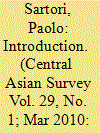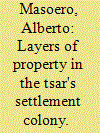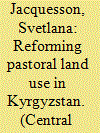| Srl | Item |
| 1 |
ID:
095552


|
|
|
|
|
| Publication |
2010.
|
| Summary/Abstract |
The goal of this paper is to analyse the impact of Russian legislation on the notary activity of sharica courts with regard to transactions involving landed property. The hypothesis is that incorrect assumptions made by Russian lawmakers as to the 'tradition' of Muslims' land rights caused a substantial loophole in the application of colonial substantive laws. On the one hand, the Russian state attempted to retain land ownership for itself by introducing regulations that formally restricted Muslims' land rights to possession and usufruct; on the other hand, the colonial administration never established regulations that ensured that these laws would be enforced by sharica courts and failed to integrate them into the application of Islamic law. Therefore, this paper aims to highlight how the colonial definition of Muslims' land rights was largely disregarded when the Muslim judiciary notarized transactions on land in accordance with sharica. This will lead to the conclusion that the limited effectiveness of the colonial legislation with regard to land in Turkestan stemmed from the failure to reform Islamic procedural law, a process that would have entailed codifying it.
|
|
|
|
|
|
|
|
|
|
|
|
|
|
|
|
| 2 |
ID:
095551


|
|
|
|
|
| Publication |
2010.
|
| Summary/Abstract |
This article explores the legal and fiscal dynamics of land tenure in pre-colonial Islamic Central Asia. It argues that controversies regarding property rights and taxation of Muslims in Russian Turkestan reflect not only colonialist misunderstandings and manipulations of legal concepts and practices of the local Islamic population during the transition to colonial rule. These issues were also rooted in a long history of contested and ambiguous property relations in pre-colonial Central Asia. By looking at documented cases of ambiguity or controversy over the legal and fiscal status of land, it is hoped to shed new light on the dynamic interplay between legal concepts and their application in pre-colonial Central Asia.
|
|
|
|
|
|
|
|
|
|
|
|
|
|
|
|
| 3 |
ID:
095549


|
|
|
|
|
| Publication |
2010.
|
| Summary/Abstract |
In April 1868 the Military Governor of the Syr-Darya province (oblast') received a petition from a community of Chala Kazakhs1 who lived in a locality known as Kara Kamysh. The petitioners complained that other Sarts most probably from nearby Tashkent, had tried to usurp their territory.
|
|
|
|
|
|
|
|
|
|
|
|
|
|
|
|
| 4 |
ID:
095554


|
|
|
|
|
| Publication |
2010.
|
| Summary/Abstract |
This article tells the story of a piece of land called Syrymbet, which was the patrimony of Middle Horde khans in the eighteenth century, but which had shrunk over the course of the nineteenth century until nothing was left of it but a small plot of privately claimed property. Over this period, which saw the erection of an imperial legal-administrative structure in the steppe, the nomadic political culture and the nature of nomadic land claims within it evolved, as Chinggisids, the traditional elite caste in Kazakh society, struggled to defend their land rights, social status and political power based in patronage. Based on a close reading of archival and published sources, this micro-history traces the actions of Syrymbet's Chinggisid claimants Aighanym and her son Chinggis, from the 1820s to the 1890s, and argues that their adaptation to Russian rule facilitated their downfall, while new elites emerged to play their roles in a transformed nomadic society.
|
|
|
|
|
|
|
|
|
|
|
|
|
|
|
|
| 5 |
ID:
095550


|
|
|
|
|
| Publication |
2010.
|
| Summary/Abstract |
In the 1890s the authorities in St Petersburg attributed enormous value to the introduction (nasazhdenie) of private land property in the eastern peripheral regions. It was considered an urgent task and a fundamental aspect in the overall scheme of building an empire. The article examines the preparatory materials of the 1901 law on land privatization in Siberia - in itself a failure with little practical significance - in the context of other forms of landholding and the peasant resettlement policy, within the social and spatial hierarchy of the imperial periphery. The journals of the Siberian Railroad Committee and other unpublished materials are used to highlight conceptions of individual ownership, the motivations and ideologies of the officials who endeavoured to draft the law. The debate as to who had the right to own land, and why, constantly intersected and mirrored the visions of the desired future of the eastern territories. Private property was treated as an addition to the existing social landscape and as an instrument of transformation. The search for a 'suitable' or 'enlightened' landowner represented an adaptation of the traditional social hierarchy to new conditions and new colonial duties to a large extent.
|
|
|
|
|
|
|
|
|
|
|
|
|
|
|
|
| 6 |
ID:
095555


|
|
|
|
|
| Publication |
2010.
|
| Summary/Abstract |
The question of pastoral land use in colonial Central Asia is set against the goals and assumptions of present-day laws and regulations in Kyrgyzstan. In order to highlight the main choices of the colonial administration and their consequences on the local level the analysis is focused on three dyads: territorial divisions versus clan divisions, ownership versus administration and administration versus self-government. By pointing out that the colonial reforms on nomads were mainly driven by the phantoms of 'clans' and 'custom', this article argues that certain misconceptions of nomadism are characteristic of any modernization programmes, be they those of colonial Russia or those that are currently being implemented. In Kyrgyzstan the recently introduced 'grazing committees' as the main actors in the management and control of pastures perpetuate the myths of self-government and tradition among nomads. In conclusion the article advances the thesis that the reliance on 'custom' and 'tradition' and the dismissal of real social relations of pastoral land use are among the most important reasons for the failure of pastoral land reforms in the past and in the present.
|
|
|
|
|
|
|
|
|
|
|
|
|
|
|
|
| 7 |
ID:
095553


|
|
|
|
|
| Publication |
2010.
|
| Summary/Abstract |
This article deals with rain-fed tilled land (bahari) and wasteland in Russian Turkestan. On the basis of archival and published sources, the numerous twists and turns of Russian surveying policies before and after the endorsement of the 1886 Turkestan Statute are shown, and problems posed by the specific, mutable nature of bahari land to the mechanism of land-tax allotment within each rural community, in particular for non-resident households are focused on. The 1900 amendments to the Statute radically changed the way land-tax was raised on bahari land: thereafter it was to be calculated on the basis of its surface area instead of as a share of the harvest. Moreover, provisions passed in 1900, but fully implemented only in 1908, extended fiscal liability to wasteland whence villagers could earn an income through grazing, collecting firewood and other activities. It is demonstrated that these measures brought about a significant expansion in fiscal revenues, thus helping to narrow and ultimately redress the deficit in the Turkestan krai's primary budget, which had been a persistent problem since the region was originally annexed in 1865.
|
|
|
|
|
|
|
|
|
|
|
|
|
|
|
|